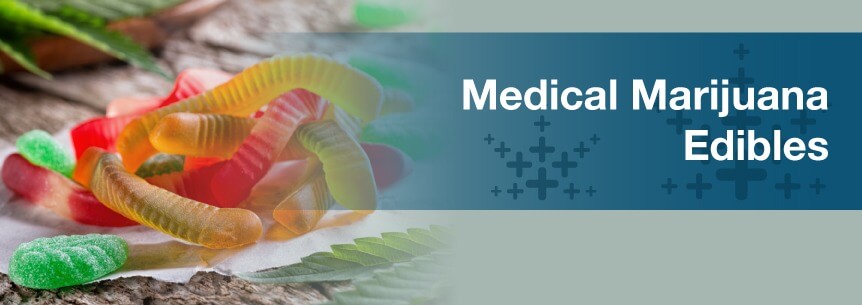
With the legal allowances and medical purposes of marijuana constantly expanding and diversifying, more and more options are becoming available to patients suffering from chronic pain and conditions, and many are choosing to medicate with cannabis by using different methods than traditional smoking. From pipes, joints and vaporizers to cannabis patches, marijuana tinctures, beverages, topicals and ingestible products, there are so many ways to reap the physical and mental benefits of marijuana.
One common method of using or taking medical marijuana is ingestion, a practice that is growing steadily in popularity as the options become more diverse and delicious. While raw marijuana leaves and buds are rich in THC-A, the acidic form of the THC cannabinoid in weed, eating cannabis raw will not necessarily deliver the full therapeutic benefits of more concentrated compounds — plus, it tends to have a leafy, planty taste that can be somewhat strong and unpleasant. Instead, the active components must first get extracted into fats, oils or alcohol before ingesting. Medical marijuana commonly gets extracted into cannabutter or cannabis-infused oil, which you can use to make edible medical marijuana products such as pot cookies and pot brownies, as well as savory dishes.
Nowadays, you don’t have to eat the traditional, pretty bitter pot brownies of old — medical marijuana patients can choose from a variety of tasty cannabis-infused snacks that barely boast a weed flavor. If you’re looking for tasty ways to prepare your edible treats for medical purposes, check out our blog, where we regularly post recipes for medical marijuana edibles. For now, here’s everything you need to know about cannabis edibles, how they work and ways of eating medical marijuana.
As an agreeable alternative to the various ways of smoking marijuana, medical marijuana edibles are snacks, foods, ingredients and other infused marijuana products users can ingest to provide the beneficial effects of cannabis. While the term “edible” can refer to either a cannabis-infused solid food or drink, drinks containing cannabis are typically called drinkables or liquid edibles. Any edible contains THC — the active marijuana component — as a key ingredient, and different edibles come in different strains and dosages, just like other weed sources. However, you can expect most edibles to contain a relatively high dosage of THC — and some edibles even have other cannabinoids like cannabidiol (CBD) to produce better medicinal results.
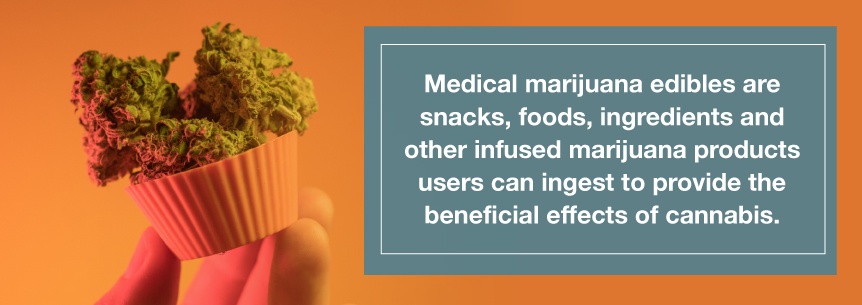
When it comes to kinds of edible marijuana products to choose from, cannabis edibles come in a wide variety of forms — from favorites like brownies, popcorn, crackers, candy and gummies to less conventional choices like pills, spreads, condiments, savory dinner dishes, smoothies, cakes and other options. The most commonly consumed kinds of edibles are as follows.
Again, these are the most common types of cannabis edibles, but other options can include candies, gummies, gums, spreads, snacks and so much more. While the medical marijuana market offers a plethora of edible products today, we can break the types of infused marijuana edibles into these three basic categories based on the way they introduce the cannabis into your system.
When users smoke marijuana, they inhale the cannabis through their lungs, after which it works its way through the bloodstream and travels to the brain and the rest of the body to provide relief. In contrast, medical marijuana edibles get directly ingested, digested and metabolized to offer a different level and different type of effect and relief. When you take cannabis orally, it travels through your digestive system and gets broken down in the stomach, after which your intestines absorb the THC and release it into your bloodstream.
Because each person will metabolize the cannabis differently, and both the digestive system and the liver process the cannabinoids before they make their way into the bloodstream, edibles can have different effects on different people. Typically, however, they take much longer to go into effect than smoking marijuana does — about half an hour to up to two hours— but the relief they provide is more potent and longer-lasting. When you eat cannabis as opposed to inhaling it, it converts into a different type of substance within your liver that provides effects twice as strong and long-lasting.
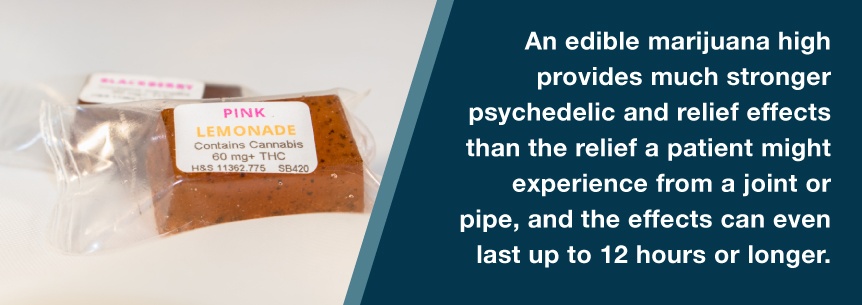
An edible marijuana high, produced by your digestive system and liver metabolizing different parts of the THC, provides much stronger psychedelic and relief effects than the relief a patient might experience from a joint or pipe, and the effects can even last up to 12 hours or longer. For this reason, it’s important to regulate your edible dosage carefully or as directed by a doctor, beginning with a small portion of about two to five milligrams and waiting for an hour before taking any more.
Providing pain relief and relaxation, cannabis edibles are a helpful, discomfort-free choice for medical patients suffering from a variety of conditions. Some of the benefits of marijuana edibles include:
Medical marijuana edibles are beneficial for treating and easing pain across a variety of chronic mental and physical conditions. The edible method is especially popular with children and elderly patients because it doesn’t require any inhalation, provides no potential damage to the lungs, is easier to take if they suffer from breathing difficulties or lung conditions and provides a different type of medically induced “high” that many patients find more agreeable than that acquired through smoking. Rather than directly hitting the brain with their effects, cannabis edibles provide a more balanced “body” high to target various areas and trigger a sedative, especially relaxing effect to alleviate pain and reduce different types of suffering.
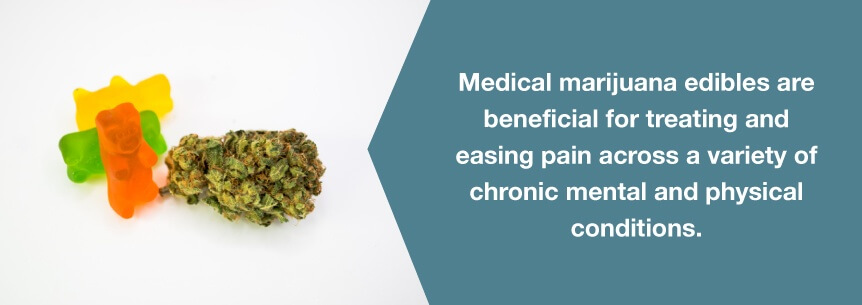
Medical marijuana physicians prescribe edibles to treat pain and provide relief for a variety of different conditions, including:
Before you incorporate marijuana edibles into your medical treatment plan, you probably want to gauge the potential health risks of consuming cannabis-infused foods, snacks, drinks and substances. Eating medical marijuana edibles is safe, cannot cause long-term toxicity and does not expose you to harmful chemicals of any kind. However, it’s important to be aware there are currently no regulations in place regarding the dosage, health and safety conditions or compliance, sourcing and quality of cannabis edibles.
To avoid consuming too much cannabis at once or being exposed to any contaminants in marijuana edibles, make sure you purchase them from a trusted, lab-tested source. Also, pay special attention to the marijuana dosage in your edibles and take them in moderation.
Also, be aware eating marijuana edibles, like any other consumption or exposure to weed, can cause the following short-term effects that may or may not change or become less noticeable as you build tolerance.
Medical marijuana edibles offer so many ways to benefit from the relaxing, pain-relieving qualities of cannabis while also enjoying a tasty treat or snack. If you’re looking for a more subtle, discreet way to medicate during the day without losing focus or taking too much, try simple solutions like cannabis-infused granola bars, candy, fruit snacks or beverages. If you’re relaxing at home, enjoying some baked good edibles might bring you more enjoyment. You can also incorporate edibles into your daily diet choices by using cannabis-infused ingredients like oils, tinctures and cannabutter in your cooking or adding cannabis leaves to your health smoothies. No matter your preferences, you can find the edible medical marijuana method that suits you and purchase reliable cannabis products here.
If you choose edible cannabis to provide you with relief from your symptoms, here are a few things to keep in mind.
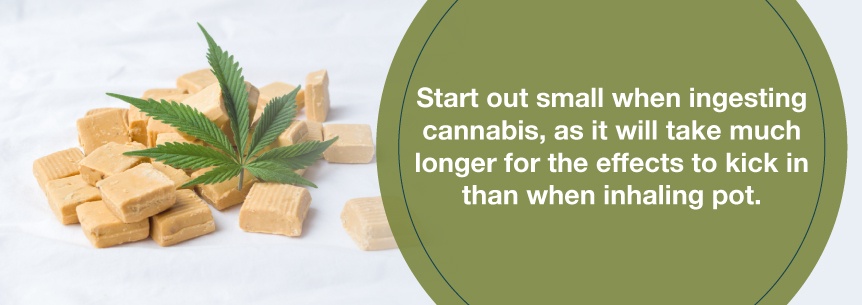
Before you make, purchase or use marijuana edibles as a delivery method for medical marijuana, you must first ensure you comply with your state’s medical marijuana laws, obtain a recommendation from a qualified physician and obtain a marijuana card, where applicable. If you are looking for a qualified medical marijuana doctor, MarijuanaDoctors.com can help. Our database is home to hundreds of physicians in every medical marijuana state. Find a doctor today.